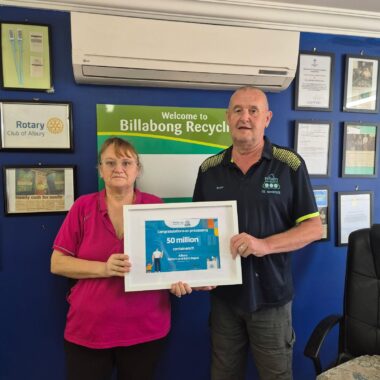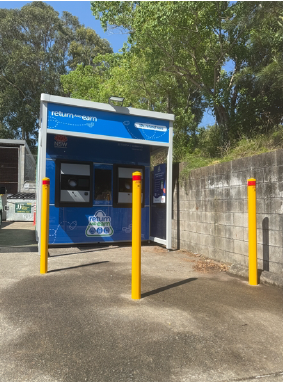Mattresses are difficult items to dispose of. They’re heavy, bulky, and susceptible to mould. Once they reach the end of their life, owners want to get them out of the way – quickly. So, recycling them responsibly generally isn’t the first thing on people’s minds. As a result, they are a common sight in bulky waste pickups, and illegal dumping is rife, ruining the otherwise clean image of quiet suburban streets across Australia.
National not-for-profit social enterprise and registered charity Soft Landing is proud to be doing the heavy lifting, recycling 481,105 mattresses of the estimated 1.8 million mattresses disposed of in Australia last year. David Petrie, Soft Landing General Manager, says, “For people’s health and the environment, it’s not as simple as out of sight, out of mind. Dumped mattresses are potential fire hazards that pollute the air and waterways. Eventually, they end up in landfill, adding pressure as waste sites struggle to keep up with our growing consumption and waste habits”.
However, even in the best-case scenario where responsible consumers recycle mattresses, many of the materials used within them can’t currently be recycled in Australia. There’s no market for them, so they’re sent to landfill, equating to an additional 15,000 tonnes of material landfilled annually.
David Petrie says, “At Soft Landing, we use a manual deconstruction method to recover and recycle up to 75% of the materials, which is significantly higher than the 44% or less achieved with mechanical shredding, the method used by many recyclers in Australia. But we still can’t reach the golden 100% recycling rate, either because there’s no value in the materials or because the technology to recycle them isn’t yet accessible, which is the case for pocket springs”.
Given the growing problem, mattresses are a critical topic this National Recycling Week (13-19 November), which encourages Australians to realise that a product’s end-of-life is as important as its original purpose.
The mattress industry is now on urgent notice to consider the entire lifecycle of the mattresses to ensure they – and their component materials – can be recycled, after being added to the Minister’s Product Stewardship Priority List for 2022-23. But for consumers, it starts with the all-important mattress purchase.
David Petrie says, “Mattresses are an investment. They’re expensive, and the average person is probably keeping their mattress for 7-10 years or longer, so the mattresses’ end-of-life is often not considered at the point of purchase. People think of it as a future problem, and that’s why we’re in the situation we’re in now”.
He says, “While considering comfort, firmness, back support and price, we encourage consumers to also consider recyclability. It’s critical that people do their research to make sure the mattress can be recycled if we ever want to break the cycle”.
People can find responsible recyclers by looking for Australian Bedding Stewardship Council (ABSC) Approved Recycler status. The ABSC is a not-for-profit entity formally endorsed by the Australian Government to develop and implement a whole-of-lifecycle approach for mattresses and bedding.
Kylie Roberts-Frost, ABSC CEO, says, “The ABSC recognises mattress recyclers like Soft Landing who meet our strict criteria for safe and environmentally responsible practices. Our approval is not given lightly; it signifies a company's dedication to outstanding collection, storage, and recycling processes for end-of-life mattresses, adhering to our stringent guidelines and ethical standards. Soft Landing’s hands-on recycling process exemplifies the kind of innovative method we love. Their approach not only extends the useful life of all the natural resources such as steel, timber, and foam but also significantly contributes to job creation within local communities”.
David Petrie says, “The cost to recyclers using manual deconstruction is higher than the mechanical shredding method; however, our manual method results in significant resource recovery gains. As a social enterprise, it also enables us to provide more jobs and training for local people experiencing barriers to employment”.
He says, “We’re hopeful that with continued pressure from the Australian Government, we can encourage mattress producers and retailers to design and sell responsibly, with the mattresses’ end-of-life in mind. This circular economy, ‘what goes around comes around’ mindset is the only way we’ll move forward, but the power ultimately lies with consumers”.
“It’s about asking the right questions – of retailers and recyclers – and knowing they can talk with their wallets to demand positive change.”
Key Facts:
How can you recycle your mattress?
Progressive local councils partner with Soft Landing to offer free kerbside mattress collection and recycling services for residents, making the task easy. Some mattress retailers handle the recycling process for consumers for a nominal fee; ask your retailer if they provide a recycling service through an ABSC Approved Recycler. Alternatively, owners can book a mattress collection online.
Soft Landing is offering a special discounted rate for mattress collection and recycling this National Recycling Week (13-19 November), with $5 off per mattress recycled (NSW, VIC and WA residents only).
About us:
Soft Landing is a national not-for-profit social enterprise and registered charity that collects and recycles mattresses to keep waste out of landfill and create jobs for people experiencing barriers to work. For every 23 mattresses that we collect and recycle, we create a job for someone who really needs one. www.softlanding.com.au
Contact details:
Rachel Walker
Communications and Marketing Manager
M: 0403 994 259


